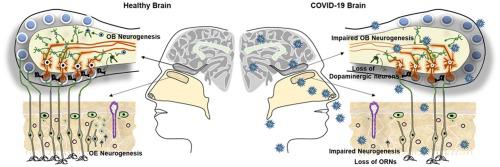Journal of Chemical Neuroanatomy ( IF 2.8 ) Pub Date : 2021-05-11 , DOI: 10.1016/j.jchemneu.2021.101965 Harini Sri Rethinavel 1 , Sowbarnika Ravichandran 2 , Risna Kanjirassery Radhakrishnan 1 , Mahesh Kandasamy 3

|
Anosmia, a neuropathogenic condition of loss of smell, has been recognized as a key pathogenic hallmark of the current pandemic SARS-CoV-2 infection responsible for COVID-19. While the anosmia resulting from olfactory bulb (OB) pathology is the prominent clinical characteristic of Parkinson's disease (PD), SARS-CoV-2 infection has been predicted as a potential risk factor for developing Parkinsonism-related symptoms in a significant portion of COVID-19 patients and survivors. SARS-CoV-2 infection appears to alter the dopamine system and induce the loss of dopaminergic neurons that have been known to be the cause of PD. However, the underlying biological basis of anosmia and the potential link between COVID-19 and PD remains obscure. Ample experimental studies in rodents suggest that the occurrence of neural stem cell (NSC) mediated neurogenesis in the olfactory epithelium (OE) and OB is important for olfaction. Though the occurrence of neurogenesis in the human forebrain has been a subject of debate, considerable experimental evidence strongly supports the incidence of neurogenesis in the human OB in adulthood. To note, various viral infections and neuropathogenic conditions including PD with olfactory dysfunctions have been characterized by impaired neurogenesis in OB and OE. Therefore, this article describes and examines the recent reports on SARS-CoV-2 mediated OB dysfunctions and defects in the dopaminergic system responsible for PD. Further, the article emphasizes that COVID-19 and PD associated anosmia could result from the regenerative failure in the replenishment of the dopaminergic neurons in OB and olfactory sensory neurons in OE.
中文翻译:

COVID-19 和帕金森病:神经发生缺陷是嗅觉系统损伤和嗅觉丧失的潜在原因
嗅觉丧失是一种嗅觉丧失的神经病原性病症,已被认为是当前导致 COVID-19 的大流行性 SARS-CoV-2 感染的关键致病标志。虽然由嗅球 (OB) 病理学引起的嗅觉丧失是帕金森病 (PD) 的突出临床特征,但 SARS-CoV-2 感染已被预测为在 COVID-10 的很大一部分患者中出现帕金森病相关症状的潜在危险因素。 19 名患者和幸存者。SARS-CoV-2 感染似乎会改变多巴胺系统并诱导多巴胺能神经元的丢失,而这已成为 PD 的病因。然而,嗅觉丧失的潜在生物学基础以及 COVID-19 和 PD 之间的潜在联系仍然不清楚。对啮齿类动物的大量实验研究表明,嗅觉上皮细胞 (OE) 和 OB 中神经干细胞 (NSC) 介导的神经发生对于嗅觉很重要。尽管人类前脑中神经发生的发生一直存在争议,但大量实验证据强烈支持成年期人类 OB 中神经发生的发生率。需要注意的是,各种病毒感染和神经病理性病症,包括伴有嗅觉功能障碍的 PD,其特征在于 OB 和 OE 中的神经发生受损。因此,本文描述并检查了最近关于 SARS-CoV-2 介导的 OB 功能障碍和多巴胺能系统缺陷导致 PD 的报道。进一步,


























 京公网安备 11010802027423号
京公网安备 11010802027423号